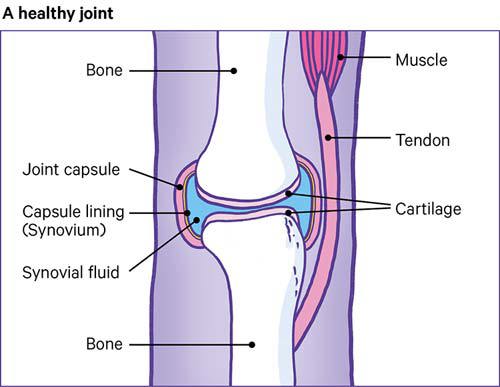

If you have osteoarthritis in your knee, you might be able to get injections of hyaluronic acid. These are also known as hyaluronan injections.
Hyaluronan injections are used to keep joints moving and reduce pain, especially when other treatments haven’t worked.
Hyaluronic acid is naturally found inside many joints in your body in the synovial fluid.
In a healthy joint, synovial fluid works as a lubricant, allowing the cartilage covering the ends of your joints to glide against one another. This keeps your joints healthy and moving freely.
It’s thought that injections of hyaluronic acid could help to lubricate joints where the cartilage has been roughened by osteoarthritis and may even help regeneration of the cartilage.
Hyaluronan injections can be used to treat arthritis. But they’re usually only prescribed if other treatments haven’t worked first.
NICE (National Institute for Health and Care Excellence) is an organisation that provides information about treating and caring for different conditions in the UK. It currently doesn’t recommend using hyaluronan injections for osteoarthritis.
NICE suggests that hyaluronan injections may reduce pain over six months. But the injections may cause short-term inflammation in the knee.
However, some doctors don’t agree with this advice and continue to legally prescribe hyaluronan injections.
You may want to discuss if hyaluronan injections are an option for you with your healthcare team. This is because different NHS locations may have different policies.
Hyaluronan injections are also available at private clinics around the UK, where you pay for the treatment yourself.
You won’t get hyaluronan injections if you have:
You will be given a hyaluronan injection into your joint. This is known as an intra-articular injection.
A nurse or trained healthcare professional will check you carefully and talk about whether the injection is suitable for you. They will give you the injection.
You may receive between one and five injections, usually a week apart, depending on which brand of hyaluronic acid your healthcare professional uses.
For at least two days after the injection, you should avoid jogging, high-impact sports or being overly active. You should also avoid carrying heavy items or standing for long periods.
You might not notice the effect of the injections straight away. Once they start working, any benefits will probably last a few months.
Hyaluronan injections have very few side effects. However, some people may have pain, stiffness or swelling in their joint after the injection. There’s also a small risk of infection.
If you notice any symptoms after the injection, tell the person treating you.
Before you have a hyaluronan injection, you should tell your healthcare team what other medicines you are taking.
Don’t use complementary treatments, such as herbal remedies, without discussing this first with a healthcare professional as some of them could react with the hyaluronan injections.
It’s also best to discuss vaccinations with your healthcare team before starting hyaluronan injections.
Before you have hyaluronan injections, you should tell the person treating you what other medications you are taking. Tell anyone else who is treating you that you’ve had hyaluronan injections recently.
There’s no need to avoid alcohol after getting a hyaluronan injection.
Guidelines state that adults shouldn’t have more than 14 units a week, and that they should spread them out over the week. In some cases, your doctor may advise lower limits.
We don’t know how hyaluronan injections might affect pregnancy or an unborn baby. To be safe, your doctor may recommend that you don’t have hyaluronan injections if you are pregnant.
Tell your rheumatology team immediately if you become pregnant whilst taking hyaluronan injections.
We don’t yet know whether hyaluronan injections can pass into breastmilk, so current advice is not to breastfeed while taking this drug.
Versus Arthritis is registered with: Fundraising Regulator
© Versus Arthritis 2024. Registered Charity Nos. 207711, SC041156. Registered office: Copeman House, St Mary’s Court, St Mary’s Gate, Chesterfield S41 7TD. Some services may be fulfilled by Versus Arthritis Trading Ltd.
Call Our Helpline 0800 5200 520